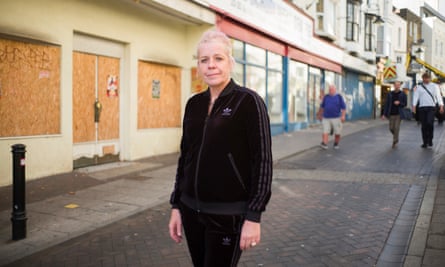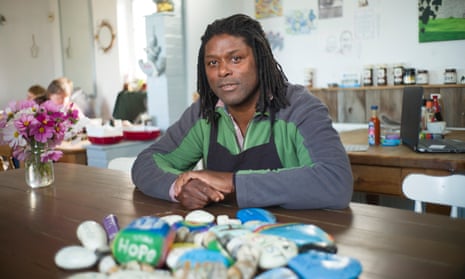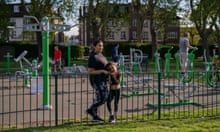Ayaan Bulale never took Nigel Farage’s failed attempt to become her local MP seriously – attributing it to the “naivety of my London bubble” – but her reaction was one of sheer horror when Ukip won control of Thanet district council days after she and her family had moved to Margate.
The four and a half years since they began a new life on the Kent coast have been marked by frequent encounters with racism – most seriously in a violent assault on her then 14-year-old daughter, but also including persistent prejudice.
Bulale said: “The racism here is subtle. It’s ignorance. People talking to you might use words like ‘coloured’ and think it’s completely normal. Or you go to a bar and the crowd will think nothing of singing along with the use of the N-word in a rap song.”
In the week when a seven-year-old boy holding a bottle told her that he “didn’t want black people to touch my drink,” statistics released by the Home Office indicated that the number of recorded hate crimes nationally had more than doubled in the past five years. There have been sharp spikes after the Brexit vote and terror attacks last year.
Areas where surges have been particularly pronounced include Kent, a county that finds itself on the Brexit frontline. The rate of reported hate crime in Kent has quadrupled since 2013-2014, while in the rest of the UK it was slightly more than double.
A crucible for factors are often cited in the hate crime debate. They include a significant leave vote (59%), consistently strong Ukip support and far-right groups who have made their presence felt both online and off. It is also home to areas with some of Britain’s highest levels of deprivation, particularly in coastal towns such as Ramsgate.
The latter – a seafront town where high street shops still stock golliwogs – is one where local councillors such as Karen Constantine say that some black and minority ethnic (BME) families are living in state of near-siege by racist neighbours.
Constantine said: “As soon as Farage hit the streets here in 2015, local people who were from a BME background found that they were suddenly subjected to hostility and comments to them in public that were vicious and frankly illegal.
“That seemed to eventually die back but what we have got now is a sort of constant racist background noise and comments along the lines of ‘those people’.”
For some it has all been too much. Kaz Peet, 56, who was among the newcomers to the coast in recent years, says the racism experienced by her mixed-race daughter is driving them out of Ramsgate.
Peet said: “It has been a journey through absolute hell. If I had known that we were going to go through this then there was no way we would have moved here. The fact that I have been able to buy a fantastic early Victorian house a stone’s throw from the coast would have meant nothing to what we have gone through.”

Others are drawing a line in the sand. Further down the coast, near Deal, Peter St Ange is in the process of transforming his cafe in Walmer into a reporting hub and support centre for hate crime victims. St Ange is the child of Windrush-generation parents and a former serviceman who laughs at the memory of the visceral racism he encountered as an 18-year-old soldier in Belfast. He was prompted to embark on the plan after one person told him that others were referring to him using a racial slur.
St Ange said: “When my parents came over from St Lucia it was to signs like ‘no dogs, no blacks, no Irish’. In my lifetime things have changed massively and I’m hopeful.” He uses painted pebbles bearing words such as “nationality”, “tribe” and “empathy” as a medium for conversation in his cafe.
He added: “Kent obviously has a reputation and you have the home of Ukip up the road. There is racism but we have an opportunity. You can’t always rely on the police – who do their best. The community have to create their own platforms.”
Statutory agencies insist that they are working hard to counter racism. Ch Supt Andy Pritchard from Kent police’s public protection and partnerships department said: “Kent police has been working to address the under-reporting of hate crime and the increase in reports, which reflects a national trend, indicates that more people have trust and confidence to report it.”
Pritchard said there had been significant improvement at the force in how hate crime was recorded, including better understanding about what constitutes a hate crime and how to support victims. Officers had been working with other bodies to set up crime reporting hubs and reach out during Hate Crime Awareness week.
Kent county council said it had been working with partners to raise awareness of abuse, including through the use of public stalls. Thanet district council said it was disappointing that hate crime figures for the county and the south-east as a whole had shown an increase.
“Dealing with hate crime is a primarily a police matter and we work with the police and a number of other agencies in the area as part of the Thanet Community Safety Partnership,” it added.
Chris Wells, who was leader of Thanet council until Ukip lost control this year, said there was no doubt that there had been a spike in concern about hate crime but insisted that societal changes had to be taken into account.
He added: “If you go back 10 years, Kent was a classic shire county, 98% white and village-based and it is changing like the rest of the country is. You will find, for example, that there is resentment about incoming labour and competition for scarce jobs.
“The situation is much more complex than people want to say. There has been a failure of politics in general to provide people with what they need, whether it’s jobs or social housing.”
On the broader question of the reported hate crime figures, the University of Kent criminologist Dr Marian Duggan cautioned against linking them to increased incidences but still stressed their importance.
“Often it might be someone going to the police because they have serious concerns about their family’s safety but for a lot of hate crime victims it’s a way of putting it behind them,” she said.
“Communities affected by hate crime want the conversation to be had about what fuels the hostilityand in order to show that it’s a valid conversation, there has to be crime data that backs that up.”








